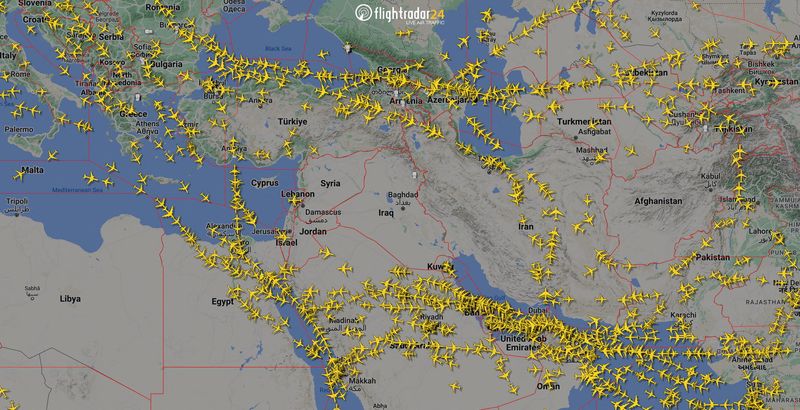By Joe Brock
SINGAPORE (Reuters) - Global airlines faced disruptions to flights on Monday after Iran's missile and drone attacks on Israel further narrowed options for planes navigating between Europe and Asia.
Iran's attack on Israel by more than 300 missiles and drones, which were mostly shot down by Israel's U.S.-backed missile defence system, caused chaos in the aviation industry.
At least a dozen airlines have had to cancel or reroute flights over the last two days, including Qantas, Germany's Lufthansa, United Airlines and Air India.
This was the biggest single disruption to air travel since the attack on the World Trade Centre on September 11, 2001, according to Mark Zee, founder of OPSGROUP, which monitors airspace and airports.
"Not since then have we had a situation with that many different air spaces closed down in that quick succession, and that creates chaos," Zee told Reuters, adding that disruptions were likely to last a couple more days.
The latest routing problems are a blow to an industry already facing a host of restrictions due to conflicts between Israel and Hamas, and Russia and Ukraine.
Iran's airspace is used by airlines travelling between Europe and Asia and those carriers will be restricted to two viable alternative routes, either through Turkey or via Egypt and Saudi Arabia, Zee said.
Israel closed its airspace on Saturday, before reopening them on Sunday morning. Jordan, Iraq and Lebanon also resumed flights over their territories.
Major Middle East airlines, including Emirates Airlines, Qatar Airways and Etihad Airways, said on Sunday they would resume operation in the region after cancelling or rerouting some flights.

It was not yet clear if the latest unrest would impact passenger demand, which has remained robust despite ongoing conflicts in Ukraine and Gaza, said Brendan Sobie, independent aviation analyst.
"If the political situation and the conflicts continue to escalate then at some point people will be concerned about travelling, but so far that hasn't happened," Sobie said.